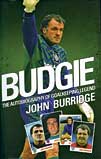 The Autobiography of a Goalkeeping Legend
The Autobiography of a Goalkeeping Legend
by John Burridge
John Blake, £16.99
Reviewed by Damon Green
From WSC 295 September 2011
Like the tale of one of those old ladies born in Paris to the sound of Robespierre's guillotine, and eventually run over by a motor car on the Champs-Élysées, it is hard to believe that the two ends of the John Burridge story belong in the same lifetime.
At the one end, a childhood in a Cumbrian pit village with no hot water and piss in the yard, a way of life unchanged since the dawn of the industrial revolution and football the "poofs' game" despised by his hard-drinking father. At the other, the sybaritic afterglow of the modern ex-professional, a TV pundit's couch on the Arabian Gulf and football for millionaires, the plaything of sheikhs.
Oddly, it is the events further away in the Budgie timeline that are in sharper focus, and his early years have the bright, vivid clarity of a cheap comic. Tony Waddington drives all the way from Stoke to sign the tough young collier's boy, but slips over by the outdoor privy and ruins his natty suit. Blackpool offer the teenager a hundred pounds a week and, overwhelmed, he rings home, but his mother, called to the telephone of the local pub, can find no words at all.
Greta Burridge, a downtrodden miner's wife in a cold, crowded pit house, plays a crucial role. Like a character from DH Lawrence who has somehow stumbled into the pages of Tiger, she contradicts her violent husband in his jealous refusal to let their boy sign for Workington. Amazed by her presumption, Burridge Snr relents and gives John a year to prove himself. And so a career that takes in 29 clubs and 771 games can begin.
The freshness of the early memories is intoxicating. The mud on the cold, hard dressing-room floors. The pitiless aggression of Fourth Division centre-forwards. And the tireless, anxious energy of a working-class lad desperate not to be rejected and go back to the pit. Later, the showpiece anecdotes about George Graham, Ossie Ardiles and Andy Gray have the glib, glossy sheen of objects taken down and handled too often. Budgie is an interesting man who has led a busy life and his tale is a good one, but as we all know, a man who prides himself on being "a character" can often come across as, well, a bit of a dickhead.
You have to wonder how much self-awareness there is here. Burridge battled mental illness on his retirement from playing – sectioned, as he tells it, on the advice of Kevin Keegan – but is breezily offhand about his "craziness" and his "antics". As a rule, I know, people with "antics" are to be spurned, but the handstands and somersaults, the superman costume, the sitting on the crossbar, tell of a desperate desire to be liked. The managers he hates – Ron Saunders at Villa, Alex Miller at Hibs – are the ones who, like his dad, show him no love. The one he rates above all, Terry Venables, is the one who cossets him, praises him, offers him the moon. And yet, note this, it's the approach of Saunders and Miller that gets him his winners' medals. Venables just prevails on him to have six cortisone injections every matchday so he can play with a knackered shoulder. And wins him nothing.
Burridge is honest enough to admit he wasn't a great keeper. Villa, he says, would never have won the European Cup with him in goal. So as the life story peters out into the usual self-satisfied bullshit of the ex-pro, you can't begrudge him his easy TV job, his hammock in Muscat or his views on "political correctness". Though you have to wonder what his old man would say.